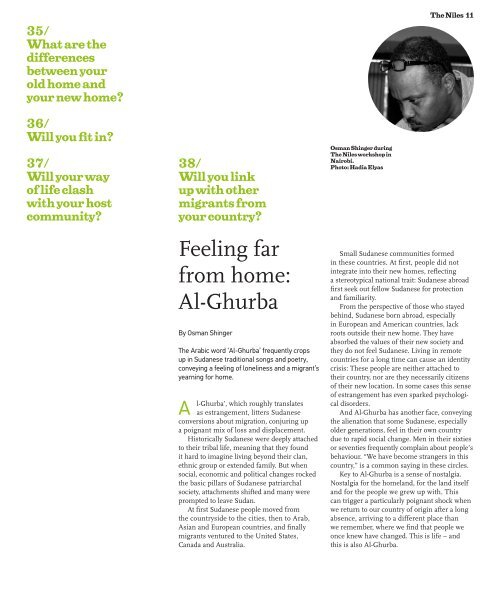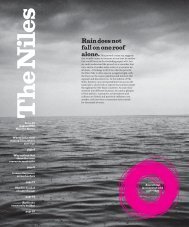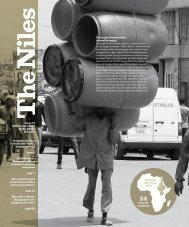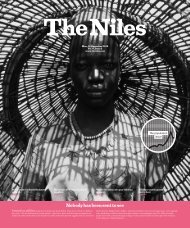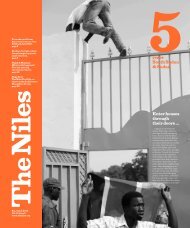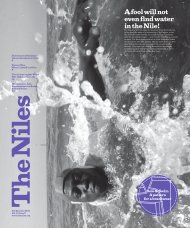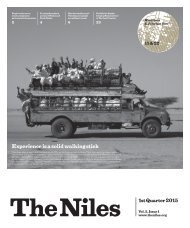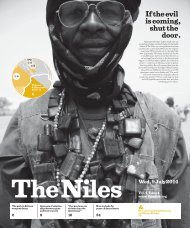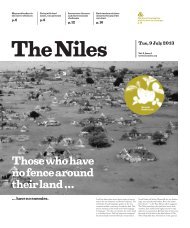The children of the land scatter like birds escaping a burning sky...
Migration is as old as humanity but the goals of migration are as varied as the people undertaking long, and often hazardous, journeys to new lands. This travel-sized edition of The Niles was written and edited by a group of The Niles correspondents from Sudan and South Sudan at a newsroom workshop in Nairobi. The journalists’ 50-question checklist for would-be migrants forms the backbone of this seventh print edition. Answers span personal stories and recollections, creating an uncompromising snapshot of the mixed motivations for leaving, spanning conflict, lack of freedom, or hopes for a rosier future elsewhere. As suggested by the quote from Abyei, tragedy is often the flip-side of the coin when “the children of the land scatter”. A sense of loss unites many of the journalists’ stories, revealing how home remains at our core, however far we go.
Migration is as old as humanity but the goals of migration are as varied as the people undertaking long, and often hazardous, journeys to new lands. This travel-sized edition of The Niles was written and edited by a group of The Niles correspondents from Sudan and South Sudan at a newsroom workshop in Nairobi. The journalists’ 50-question checklist for would-be migrants forms the backbone of this seventh print edition. Answers span personal stories and recollections, creating an uncompromising snapshot of the mixed motivations for leaving, spanning conflict, lack of freedom, or hopes for a rosier future elsewhere.
As suggested by the quote from Abyei, tragedy is often the flip-side of the coin when “the children of the land scatter”. A sense of loss unites many of the journalists’ stories, revealing how home remains at our core, however far we go.
Create successful ePaper yourself
Turn your PDF publications into a flip-book with our unique Google optimized e-Paper software.
35/<br />
What are <strong>the</strong><br />
differences<br />
between your<br />
old home and<br />
your new home?<br />
36/<br />
Will you fit in?<br />
37/<br />
Will your way<br />
<strong>of</strong> life clash<br />
with your host<br />
community?<br />
38/<br />
Will you link<br />
up with o<strong>the</strong>r<br />
migrants from<br />
your country?<br />
Feeling far<br />
from home:<br />
Al-Ghurba<br />
By Osman Shinger<br />
<strong>The</strong> Arabic word ‘Al-Ghurba’ frequently crops<br />
up in Sudanese traditional songs and poetry,<br />
conveying a feeling <strong>of</strong> loneliness and a migrant’s<br />
yearning for home.<br />
A<br />
l-Ghurba’, which roughly translates<br />
as estrangement, litters Sudanese<br />
conversions about migration, conjuring up<br />
a poignant mix <strong>of</strong> loss and displacement.<br />
Historically Sudanese were deeply attached<br />
to <strong>the</strong>ir tribal life, meaning that <strong>the</strong>y found<br />
it hard to imagine living beyond <strong>the</strong>ir clan,<br />
ethnic group or extended family. But when<br />
social, economic and political changes rocked<br />
<strong>the</strong> basic pillars <strong>of</strong> Sudanese patriarchal<br />
society, attachments shifted and many were<br />
prompted to leave Sudan.<br />
At first Sudanese people moved from<br />
<strong>the</strong> countryside to <strong>the</strong> cities, <strong>the</strong>n to Arab,<br />
Asian and European countries, and finally<br />
migrants ventured to <strong>the</strong> United States,<br />
Canada and Australia.<br />
Osman Shinger during<br />
<strong>The</strong> Niles workshop in<br />
Nairobi.<br />
Photo: Hadia Elyas<br />
<strong>The</strong> Niles 11<br />
Small Sudanese communities formed<br />
in <strong>the</strong>se countries. At first, people did not<br />
integrate into <strong>the</strong>ir new homes, reflecting<br />
a stereotypical national trait: Sudanese abroad<br />
first seek out fellow Sudanese for protection<br />
and familiarity.<br />
From <strong>the</strong> perspective <strong>of</strong> those who stayed<br />
behind, Sudanese born abroad, especially<br />
in European and American countries, lack<br />
roots outside <strong>the</strong>ir new home. <strong>The</strong>y have<br />
absorbed <strong>the</strong> values <strong>of</strong> <strong>the</strong>ir new society and<br />
<strong>the</strong>y do not feel Sudanese. Living in remote<br />
countries for a long time can cause an identity<br />
crisis: <strong>The</strong>se people are nei<strong>the</strong>r attached to<br />
<strong>the</strong>ir country, nor are <strong>the</strong>y necessarily citizens<br />
<strong>of</strong> <strong>the</strong>ir new location. In some cases this sense<br />
<strong>of</strong> estrangement has even sparked psychological<br />
disorders.<br />
And Al-Ghurba has ano<strong>the</strong>r face, conveying<br />
<strong>the</strong> alienation that some Sudanese, especially<br />
older generations, feel in <strong>the</strong>ir own country<br />
due to rapid social change. Men in <strong>the</strong>ir sixties<br />
or seventies frequently complain about people’s<br />
behaviour. “We have become strangers in this<br />
country,” is a common saying in <strong>the</strong>se circles.<br />
Key to Al-Ghurba is a sense <strong>of</strong> nostalgia.<br />
Nostalgia for <strong>the</strong> home<strong>land</strong>, for <strong>the</strong> <strong>land</strong> itself<br />
and for <strong>the</strong> people we grew up with. This<br />
can trigger a particularly poignant shock when<br />
we return to our country <strong>of</strong> origin after a long<br />
absence, arriving to a different place than<br />
we remember, where we find that people we<br />
once knew have changed. This is life – and<br />
this is also Al-Ghurba.<br />
<strong>the</strong>niles7_20160314.indd 11<br />
2016/3/14 11:38 AM


